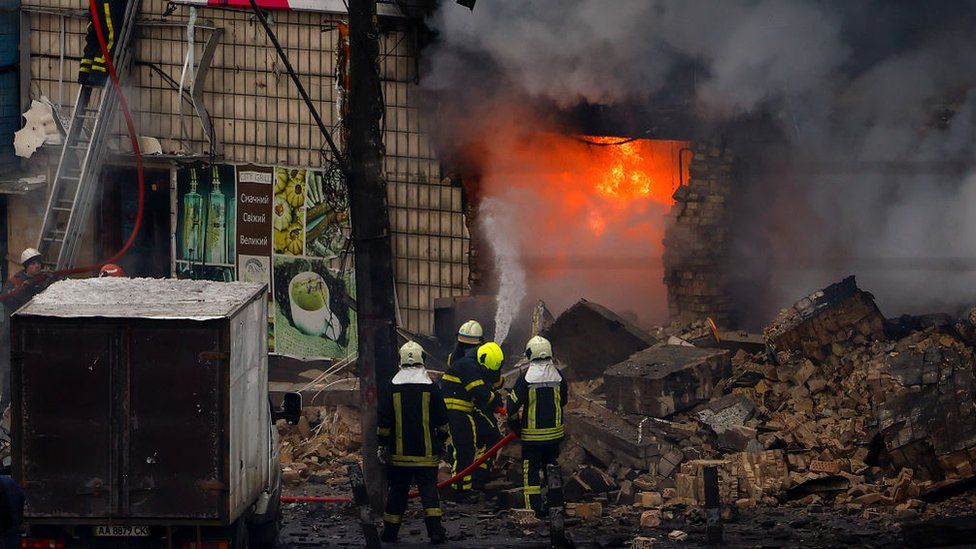
President Volodymyr Zelensky has accused Russia of “crimes against humanity” after a bombardment caused blackouts across Ukraine.
At least six civilians were killed in the barrage, and officials were forced to shut down three nuclear reactors due to power outages.
Neighbouring Moldova also experienced blackouts, but it was not directly hit.
With winter setting in, Moscow has stepped up strikes on Ukraine’s energy infrastructure.
Officials say Russia’s missile strikes on energy stations has caused “colossal” damage and left more than half of the country’s power grid in need of repair.
Addressing an urgent meeting of the UN Security Council in New York, Mr Zelensky said the latest strikes had forced “millions of people to stay without energy supplies, without heating, without water” as temperatures started to drop below zero.
“That’s the Russian formula of terror,” he told delegates in New York via video link.
On Wednesday, an air-raid alert was issued across Ukraine, followed by reports of explosions in a number of locations – including in the capital Kyiv and in the Western city Lviv.
In the southern Zaporizhzhia region, a newborn baby was killed when a missile hit a maternity unit, emergency services said.
General Valeriy Zaluzhniy – the commander of Ukraine’s armed forces – said 67 cruise missiles were launched by Moscow, with air defences successfully intercepting 51 projectiles.
But the attack has caused significant damage to infrastructure across the country.
In Kyiv, parts of the city were left without water and completely without power. By nightfall Mayor Vitali Klitschko said at least 80% of residents remained without power or water.
Most thermal and hydro-electric power plants were forced to shut down as well, Ukraine’s energy ministry said.
Shortly before the fresh reports from Kyiv and Lviv, officials said southern Ukraine had come under renewed assault.
The governor of the Mykolaiv region warned of “many rockets” arriving from the south and east.
Kremlin Press Secretary Dmitry Peskov did not comment on the attacks during a visit to the Armenian capital Yerevan, but he pledged that the “future and the success of the special operation (Moscow’s term for its war in Ukraine) are beyond doubt”.
In response, Ukrainian Volodymyr Zelensky accused Moscow of “acts of terror” and will address an emergency session of the UN Security Council on Wednesday evening in New York.
Speaking following the attacks, he pledged that Ukraine would continue to fight and hailed Ukrainians as “an unbreakable people.”
Moscow has said that attacking Ukraine’s power grid could weaken its ability to fight and drive its leaders to the negotiating table.
But French President Emmanuel Macron wrote on Twitter that such strikes against “civilian infrastructure” constituted a war crime, following similar comments from the US.
Blackouts in Moldova
More than half of Moldova was left without electricity, deputy prime minister Andrei Spinu wrote on Twitter. He said the attack on Ukraine’s energy infrastructure has caused a “massive blackout”.
Within a few hours power was restored in much of the capital, Chisinau, where a third of the Moldovan population lives.
Moldova also experienced widespread power cuts as a result of strikes on Ukraine on 15 November, Mr Spinu said. Mobile networks were also badly affected.
Energy policy analyst Sergiu Tofilat said that because Moldova and Ukraine were connected to the European grid in March, one of the connection points on the power line between Moldova and neighbouring Romania shut down automatically if Ukraine was hit to protect the system: “We reconnect once Ukraine has assessed the damage.”
In response to the outages, Moldovan President Maia Sandu said Russia had “left Moldova in the dark”.
“Russia’s war in Ukraine kills people, destroys residential blocks and energy infrastructure with missiles…” she wrote on Facebook. “But the electricity supply can be restored. We will solve the technical problems and we will have light again. All state institutions are working in this direction.”
